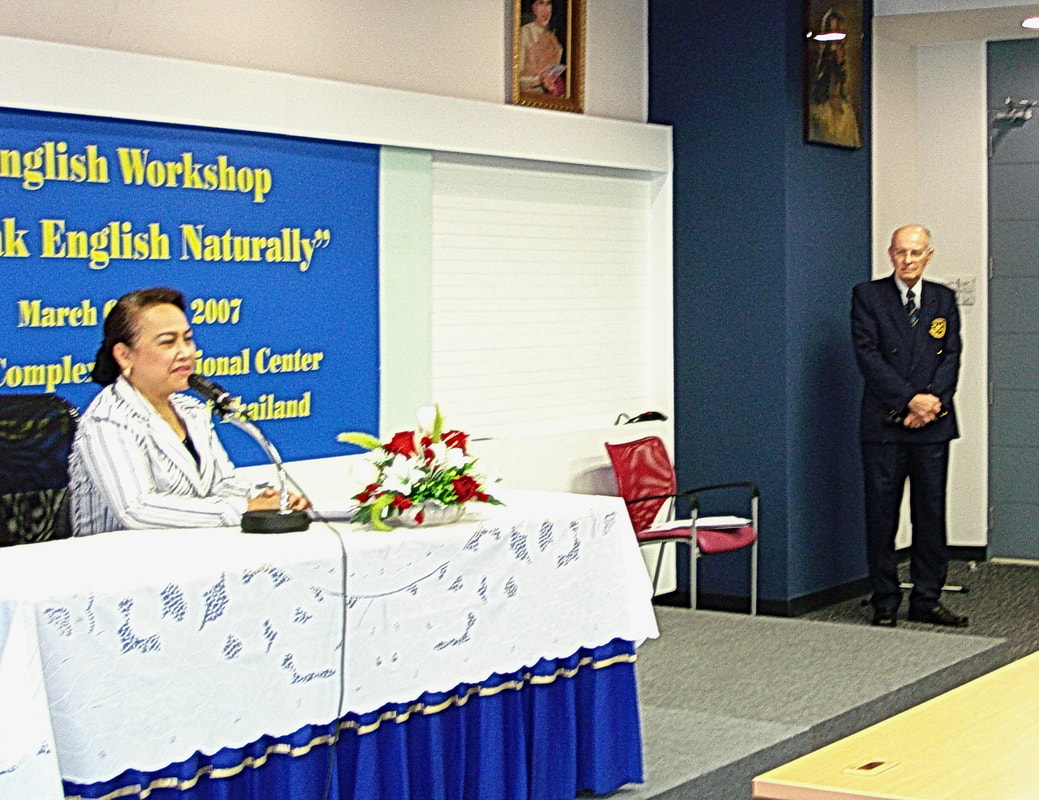|
REFLECTIONS ABOUT TEACHING ENGLISH IN THAILAND
Twenty years ago Dr. Janjira Wongkhomthong and I undertook an innovative venture, to transform Christian University of Thailand (CUT) into the English language hub of the western exurbia of Bangkok. It is fairer to say she directed the exploration and I was her scout. The objective was to have CUT come to mind when people in our part of the country thought of English language. As I reminisce, what we tried from 2001-2007 was both audacious and intriguing. There were lessons to be learned from our attempts, mostly about intractable obstacles that block educational innovation and English language enhancement in Thailand. First a list of things we tried: 1. “English activities workshops for teachers” (7+ workshops) 2. “English camps” (5 week-long camps and several one day fun events) 3. “English for Professional Nurses” (10 workshops) 4. “English for RATGEN” (The Ratchaburi Electric Generating Company) (4 modules) 5. “English for the Ministry of Culture headquarters staff” (3 modules) 6. “English for staff of Nakhon Pathom District” (one attempt) 7. “English for staff of the Governor’s Office of Nakhom Pathom” (one module) 8. Required English proficiency for all degree programs of CUT’ 9. Master of Arts in Teaching English as a Second Language 10. “English In A Minute” (4 series of tapes for local radio stations) 11. “English for Advanced Professional Nurses” (specialized course in the curriculum) 12. English contests for high school students 13. Preparation for passing the government English exams These endeavors were of three types: (1) to establish the CUT “brand” as a reliable and available resource and top-notch center for English programs; (2) to meet expressed need for special English training in workplaces; (3) to explore research and development plans for meeting the country’s need for better English competency. In retrospect we learned more about what we ought to be doing than what people wanted us to do. Our discoveries were potentially more valuable for establishing administrative priorities than educational plans. English is not a top priority. It is important to keep this in mind. All attempts to teach English confront the fact that something else is more important. English acquisition is not unimportant, but there are always over-riding reasons for students and clients to sign up for a course or event. English is supplemental. Our efforts were most successful when we aimed to satisfy the main objectives. English teachers liked our workshops if they were fun, if they provided ideas for things to do with children that didn’t need a lot of preparation, and if the workshop filled some in-service requirement for the teachers. The workshops for nurses were a hit as long as we focused on successful communication with patients, and that involved basic principles of communication with people of different cultures. Profit should not be an objective. Aside from full-fledged academic courses, one-time short courses and workshops are not highly profitable. The reason for providing the workshops and events should be to publicize the institution, to expose the workshop leaders to workplace realities, and to show support for community concerns. An effective language workshop must have an effective student-teacher ratio which will always be smaller than a student can afford, so supplemental finances are always going to be needed either by reducing the cost of the workshop (meaning the university assumes some of the cost) or by attaching the workshop to a program that is funded otherwise (which usually involves increasing the number of participants and reducing the learning outcomes). Special English takes R&D. By the end of our 7 years we had learned that there is no short-cut in the research and development of helpful courses for specialized workers, but there are ways to be more effective. Every workplace in Thailand has its own limited need for using English. It is best to get clear about what the participants need to be able to communicate in English before (or at the beginning of) a workshop. If the need is for staff to take international visitors on a tour of a factory the conversation is different from negotiating a contract for equipment. Our most successful short courses were those where the communication need was clearest and we had time to refine the course. Proficiency takes time. There is a continual stream of programs that promise you can learn a language in no time. Those are unscrupulous. On average it takes 200 hours of educational effort to improve one level in English proficiency, from early intermediate to intermediate, for example. For this reason, “achievement” is often substituted for “proficiency” as a program objective. It is too disheartening to come right out with the truth that a 20-hour workshop can’t get you very far toward proficiency. Thailand is getting better. It is undeniable that it is easier to get around the country using only English than it used to be. Far more people have functional levels of communication. But at the same time graduating students in Thailand have slipped below those of neighboring countries to such an extent that the educational effort in Thailand is widely agreed to be failing. One explanation for this paradox is that the prescribed English curricula are wrong, and so students are not motivated to do more than pass the necessary exams, but they learn to get by with English in many other ways. That, too, was one of the things we learned between 2001 and 2007, but we did not find out what to do about it. Policy decisions are not in the hands of English teachers.
0 Comments
Leave a Reply. |
AuthorRev. Dr. Kenneth Dobson posts his weekly reflections on this blog. Archives
March 2024
Categories |
| Ken Dobson's Queer Ruminations from Thailand |
|

 RSS Feed
RSS Feed
